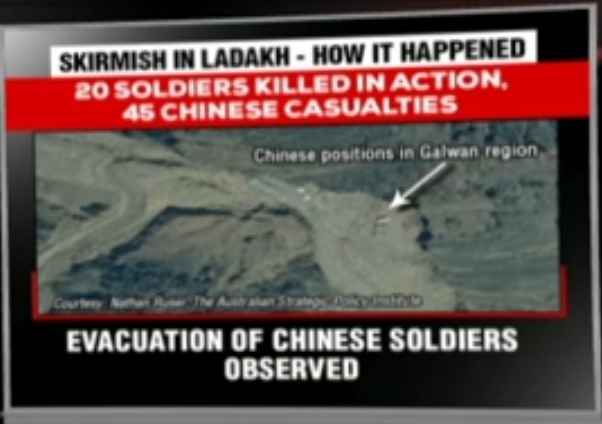China’s Brutal Assault On Indian Soldiers, Some Fell Into Icy River
 India has conveyed to China the fact that the deadly clash in eastern Ladakh on Monday night will have “a serious impact” on relations between the two countries. Foreign Minister S Jaishankar shared this with his counterpart in Beijing in a phone conversation today. Both sides agreed not to take “any action to escalate matters”, a statement from the Foreign Ministry said.
India has conveyed to China the fact that the deadly clash in eastern Ladakh on Monday night will have “a serious impact” on relations between the two countries. Foreign Minister S Jaishankar shared this with his counterpart in Beijing in a phone conversation today. Both sides agreed not to take “any action to escalate matters”, a statement from the Foreign Ministry said.
20 soldiers including a Colonel have been killed in the line of duty. Their sacrifice “will not be in vain,” Prime Minister Narendra Modi said today in his first comments on the Galwan Valley clash, the worst in nearly five decades along the border with China.
In the violent face-off which took place at nearly 15,000 feet near the freezing Galwan River, soldiers were attacked with iron rods and nail-studded clubs. There was no gunfire in keeping with long-standing rules of engagement.
China reneged on the agreed-on terms of disengagement agreed upon at a meeting last week between senior military officers of the two countries in “an attempt by the Chinese side to unilaterally change the status quo” the army said last night, confirming the loss of 20 Indian soldiers, many of whom, it said died of injuries and were “exposed to sub-zero temperatures.”
Many of those killed appear to have been punched or shoved off a ridge onto rocks and into the icy river. Postmortem examinations on those killed showed that the “primary reason for death is drowning and it looks like they fell from a height into the water because of head injuries,” an official told news agency AFP.
Sources told AFP that military transport aircraft had made a number of rare night-time landings in Leh, the capital of Ladakh.
Sources in Ladakh told News Agency that some soldiers who were injured are in critical condition now but said the army alone is authorized to comment on the matter.
The tension at the border had been climbing through May with China crossing the Line of Actual Control at different places. Several Indian and Chinese soldiers were injured last month in a clash involving fists and stone-throwing at Pangong Like in the western Himalayas.
Advertisement
Military experts say one reason for the face-off building up to its deadly climax on Monday is that India has been building new state-of-the-art facilities to improve connectivity and narrow the gap with China’s superior infrastructure.
At Galwan, India completed a road leading to the Daulat Beg Oldie airfield last October. After years of neglect Prime Minister Narendra Modi’s government has pushed for improving connectivity and by 2022, 66 key roads along the Chinese border will have been built.




